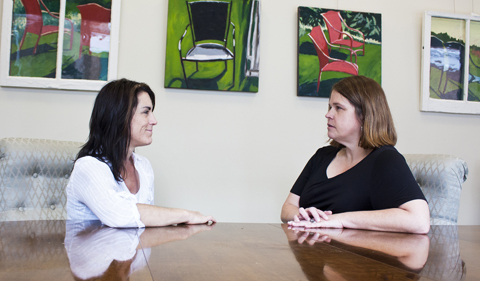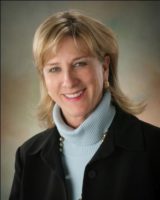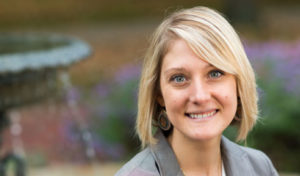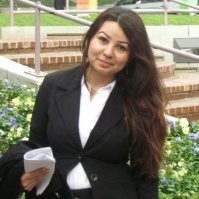
From left, Dr. Julie White, Director of WGSS and Dr. Kim Little, WGSS faculty adviser
The Women’s, Gender, and Sexuality Studies program provides unique opportunities for graduate students to conduct research and gain teaching experience.
Dr. Julie White, Associate Professor and WGSS Program Director, notes that it is becoming increasingly important for students to have experience in teaching diversity-based subject matter as they enter the job market. The WGSS Graduate Teaching Fellowship provides just such experience, giving fellowship awardees an edge in their employment searches.
Teaching Fellows Gain Invaluable Experience
The teaching fellowship, which is exclusively open to graduate students who have completed or who are working toward the WGSS certificate, gives awardees the opportunity to develop teaching skills while working closely with experienced professors.
“The fellowship,” the guidelines explain, “provides a year of assistantship support and a structured mentoring experience. The teaching fellow is paired with a WGSS faculty member to collaborate on course content and assessment for a section of WGSS 1000, our introductory course. The faculty-fellow pair will work together to develop a syllabus, lectures, and discussion-session formats.”
While teaching fellowship recipients can potentially be the instructor of record for WGSS 1000 during fall semester, the award guarantees that awardees will be instructors of record during spring semester. This official recognition of fellows’ teaching experience is invaluable as graduates enter the job market.
Alum Barbara Allushuski Gives Back to OHIO

Barbara Allushuski, OHIO alum and donor
The WGSS program also provides to one or two graduate students an annual award called the Barbara E. Allushuski Graduate Fellowship, a $1,000 gift that supports awardees’ research. The funds are intended to be “a supplementary form of support that will facilitate student work and research as part of a community of scholars and activists focused on gender justice.”
Dr. Susan Burgess, Professor of Political Science and former director of Women’s Studies, worked closely with Barbara Allushuski (’74) to create the fellowship. She refers to Allushuski as “a leader in the best sense of the word.”
“Thanks to Barbara’s generosity, leadership, and vision, the impact of that single Women’s Studies class she took in her first year continues in the form of the Allushuski Fellowship, reminding us all that what happens in our time at OHIO can really matter, and can continue to matter long after we leave the campus,” Burgess remarks.
“Barbara took an introductory class in Women’s Studies in her first year and said that it changed her life, providing her with an intellectual basis for understanding the world, as well as to develop confidence and ambition as a student, and later as a vice president of a large firm in Detroit. As she worked her way up the corporate ladder, she never forgot the key role that Women’s Studies had played in her college years and she continued to learn firsthand the pivotal role that women can play in mentoring other women. She shared many wonderful stories with me about her time at OHIO and the pivotal role that Women’s Studies had played in her intellectual and career development, and even in raising her family. She has stated that none of that would have happened without that Women’s Studies class she took in her first year at OHIO,” Burgess explains.
The Allushuski Fellowship helps facilitate productive conversations between members of the campus community on issues of gender, social justice, and identity studies, among other topics. Awardees give one public lecture during the academic year and coordinate a reading/discussion group which brings together faculty, graduate students, and undergraduates.
“The Allushuski Fellowship is supposed to be used to enhance undergraduate learning, which is one reason why recipients are required to give a public talk about their work that is accessible to non-experts. The talk—and a willingness to get involved in the WGSS program more generally—is the only formal requirement. In return, fellows get $1,000 that they can spend on teaching or research. Typically it has been used for travel to conduct research or present at conferences,” states Dr. Patty Stokes, Assistant Professor in the WGSS program.
Allushuski Fellows Express Gratitude

Kelly Masterson, doctoral student of English and Allushuski Fellow
“The Allushuski fellowship was an invaluable experience for me both professionally and personally. The fellowship allowed me to have productive conversations and foster relationships with fellow graduate students as well as WGSS faculty. Learning from those conversations, especially with those from different fields than mine, was one of the most fruitful aspects of my time as an Allushuski fellow. I was also able to present my work on 20th-century American writer Evelyn Scott and depictions of motherhood and the maternal body in her 1921 novel The Narrow House, giving me the opportunity to present my research among WGSS scholars both in and out of my field,” says English doctoral candidate Kelly Masterson, one of the 2014-15 Allushuski fellows.

Zulfia Zaher, doctoral student in the School of Media Arts & Studies and Allushuski Fellow
“The Allushuski fellowship helped me to hone my research skills and disseminate my scholarship in many ways. I believe in sharpening research skills one needs to engage in research endeavours. I used the grant for two research projects. For the first research project, I traveled to Toronto to interview South Asian entrepreneur women who were the first generation immigrants in Canada. I interviewed them about the way they use social media to promote their small businesses. I found out that though South Asian women believe social media help to promote their business, they lacked business analytics skills to measure the return on investment (ROI). Based on this finding, I suggested a framework to address social media literacy. I also used part of this funding to present one of my other research papers at the National Communication Association (NCA) Conference in Las Vegas. The study titled “Normalizing Gender Norms: A Framing Analysis of Niqab (Mask) Program at Yak Television in Afghanistan” was presented at Feminism division. In a nutshell, Allushuski fellowship helps young and emerging scholars to locate the intersections of power relations in academic scholarship and challenge the taken for granted practices,” says Zulfia Zaher, doctoral student in the School of Media Arts & Studies, Feminist and Women’s Studies Division.
Eligibility and Applications
Unlike the WGSS Teaching Fellowship, the Allushuski Graduate Fellowship is open to all graduate students, though strong preference is given to those who have completed or are pursuing the WGSS certificate. Students who are interested in obtaining the WGSS certificate should contact Dr. Kim Little.
Applications for next year’s Teaching Fellowship and Allushuski Graduate Fellowship will be accepted in May 2017. Interested students may contact Jamie Dewey and request to be added to the WGSS listserve. The listserve provides information about WGSS events and distributes application materials each April.



















Comments